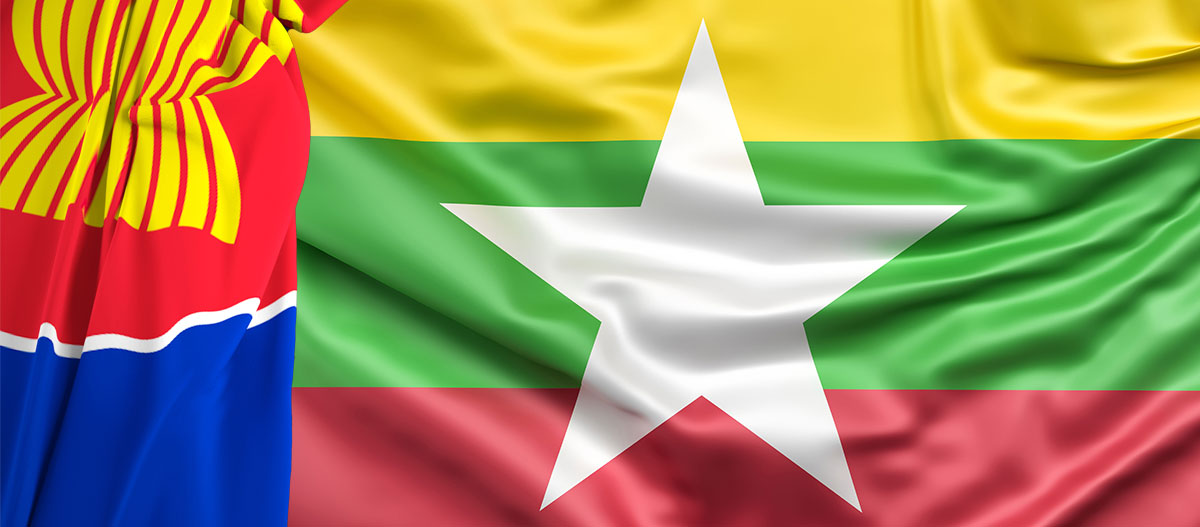The February 1 coup and ongoing violence in Myanmar has rattled civil societies and governments across Asia. Around 70 civilians have already lost their lives while protesting peacefully against Myanmar’s military junta. The Civil Disobedience Movement, led by government servants, is also facing brutal suppression at the hands of Myanmar’s security agencies. Despite concerns, the international community has also failed to restore normalcy.
To be sure, the restoration of democracy, howsoever flawed and majoritarian under the Aung San Suu Kyi-led NLD (National League for Democracy) rule, is not conceivable anytime soon — at least not peacefully. The status quo ante hinges on an external intervention under the R2P (Right to Protect) provision of the United Nations, which hasn’t caught the imagination of UNSC members yet and is unlikely to do so in future.

The Myanmar conundrum has exposed ASEAN’s (Association of Southeast Asian Nations) vulnerabilities and shortcomings once again. The 10-member Southeast Asian bloc, of which Myanmar has been a member since 1997, is facing international backlash. Both China and the US have encouraged ASEAN to be in the “driver’s seat” and find a way out. Apparently, ASEAN’s long-cherished insistence on the “ASEAN centrality” is thrown back at it, leaving it flabbergasted, divided, and mostly ineffective.
To pick up the pieces, ASEAN called an emergency virtual meeting on March 2, showing symptoms of deep institutional dilemma. Despite a tough stand taken by the trio of Indonesia-Malaysia-Singapore, the meeting could not yield tangible results. Averse to imposing sanctions or punitive measures against Myanmar, Thailand and Vietnam contributed to softening the statement issued by Brunei, the 2021 ASEAN Chair. Vietnam, currently a non-permanent UNSC member, fell short of criticising the coup and suppression of democracy in Myanmar, in its UN statements. Thailand’s decision to ban protests by foreigners is also targeted against anti-coup Myanmar expats and workers.
Clearly, ASEAN’s decades-old tradition of non-interference in the internal matters of members and a consensus-based approach, duly-enshrined in the ASEAN Charter, have been exploited for years as an excuse for its inaction on regional humanitarian and normative crises. Whether it was the Rohingya genocide under Suu Kyi’s watch, the 2014 Thai coup or Duterte’s drug war, ASEAN conveniently kept quiet. Devoid of any contingency mechanism to deal with such crises, ASEAN is yet again facing its worst nightmare.
In the 1990s, the end of the Cold War, coupled with its success in resolving the Cambodian crisis encouraged ASEAN to reach out to potential members. Vietnam and Myanmar figured prominently in that list. To support Myanmar’s candidature, Thailand proposed the idea of “constructive engagement”, highlighting that as Myanmar’s isolation had proved counterproductive, ASEAN should comprehensively engage Myanmar while convincing the junta to restore democracy.
Two decades later, not just Myanmar but Thailand too is controlled by authoritarian regimes. Nosediving of “constructive engagement” opens up opportunities for ASEAN to introspect, reform, and downsize if necessary. Letting go of members that do not abide by international norms and rules is a difficult but a necessary decision that ASEAN must make, not for others but for its own sake.
For one, ever since its induction, Myanmar has not contributed enough to ASEAN regionalism. As one of ASEAN’s least developed countries, it mostly remained a free-rider. Unlike Vietnam, it remained a net recipient of funds and technology and failed to make tangible contributions. Even with regard to the 2011-2015 democratic reforms, Myanmar made that transition not because of ASEAN; it did so because of the generals’ fear of stronger diplomatic-military actions by the Obama administration.
Myanmar’s ASEAN inclusion in the 1990s gave it the much-needed legitimacy it was vying for. Even today, ASEAN is (inadvertently) functioning as a diplomatic shield protecting Myanmar against stringent international action. ASEAN’s “constructive engagement” encouraged almost all its dialogue partners to engage with Myanmar overlooking normative concerns. It is intriguing how during the early 2000s, the sanctions imposed by the US were circumvented by its own Asian partners.
Even during the quasi-democratic rule of Suu Kyi-led NLD, countless atrocities against the Rohingya minorities rattled ASEAN. Indonesia and Malaysia’s frequent protests exposed the NLD government, reflected poorly on ASEAN unity, and exposed its normative capacity shortfalls.
Going forward, a practical step for ASEAN could be to keep its good offices active to negotiate a return to democracy with the Myanmar Junta. An Indonesia-led minilateral team might also yield some tangible gains provided ASEAN stands committed to finding an out-of-the-box solution. Indonesia’s minilateral shuttle diplomacy in resolving the Preah Vihear dispute has already proved its efficacy.
Myanmar ignominy is a blessing in disguise for ASEAN, whose failure to take firm-decisive steps has weakened it both regionally and internationally. The covert Thai-Vietnamese support to Myanmar is another “bad precedent in making”, which would further relegate ASEAN’s normative dimensions. Drastic as it may sound, ASEAN is in dire need of reformative steps.
From refocusing on the founding-5, implementing qualified majority, revising the ASEAN Charter, and empowering the Secretary-General to making the ASEAN Intergovernmental Commission on Human Rights functional — all steps are urgent.
Considering its limited influence over Myanmar, the trio in ASEAN should consider scaling down its ties with Myanmar, which should be eventually followed by sanctions and suspension of ties. A careful SWOT analysis indicates that the Junta would be worse off-should ASEAN go down the sanctions road. However, it has to ensure that common people of Myanmar do not suffer.
Downsizing ASEAN would not only strengthen its normative commitment but might also encourage its dialogue partners (Japan, China, Korea etc.), to take a tougher stand. Without their active assistance neither sanctions nor downsizing ASEAN would succeed.
For years, experts have argued for downsizing ASEAN to make it a “coalition of willing”. The Myanmar coup has brought the moment where ASEAN could undertake a serious introspection about its rules and norms and downsize itself, lest it runs the risk of turning ineffective and redundant.
This article was first published in The Indian Express on 12 March 2021.
Last Update: 11/11/2021